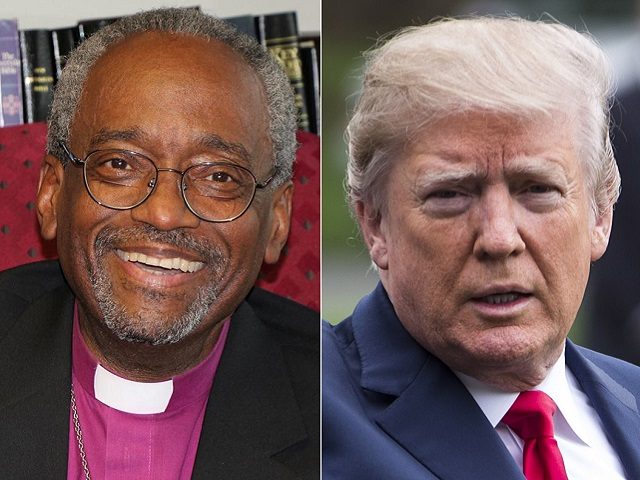Leaders from a number of progressive, mostly mainline U.S. Christian churches have rejected President Donald Trump’s “America First” policies in favor of “global development.”
In an online manifesto titled “Reclaiming Jesus,” 23 bishops, pastors, and other Christian leaders have countered pro-Trump Evangelicals by decrying “a dangerous crisis of moral and political leadership at the highest levels of our government.”
It is often the duty of Christian leaders to speak the truth in love to our churches and to name and warn against Christian “complicity” in cultural captivities, false doctrines, and political idolatries, the statement reads, in a thinly veiled rebuke to pro-Trump Christians.
The statement’s signatories include the presiding bishop and primate of the U.S. Episcopal Church, Rev. Michael B. Curry, the president of the Global Alliance Interfaith Network, Bishop Carroll A. Baltimore, and the former general superintendent of the Wesleyan Church, Rev. Dr. Jo Anne Lyon, as well as professors from Union Theological Seminary, Duke Divinity School, and Columbia Theological Seminary.
Among the “false doctrines” condemned by the declaration are anti-immigration policies, shrinking government programs combined with tax cuts, and “America First.”
“We reject ‘America first’ as a theological heresy for followers of Christ,” the statement reads. “While we share a patriotic love for our country, we reject xenophobic or ethnic nationalism that places one nation over others as a political goal” and embrace rather the goal of “genuine global development that brings human flourishing for all of God’s children.”
“Serving our own communities is essential, but the global connections between us are undeniable,” the signers assert.
The declaration also seems to accuse the Trump administration of racism and bigotry.
“We reject the resurgence of white nationalism and racism in our nation on many fronts, including the highest levels of political leadership,” the statement reads.
“In particular, we reject white supremacy and commit ourselves to help dismantle the systems and structures that perpetuate white preference and advantage,” it says. “Further, any doctrines or political strategies that use racist resentments, fears, or language must be named as public sin—one that goes back to the foundation of our nation and lingers on.”
Along with racism, the manifesto claims that the Trump administration has condoned violence against women by “publicly ignoring” it.
“We reject misogyny, the mistreatment, violent abuse, sexual harassment, and assault of women that has been further revealed in our culture and politics, including our churches, and the oppression of any other child of God,” it states. “We lament when such practices seem publicly ignored, and thus privately condoned, by those in high positions of leadership.”
While the statement asserts that it is time to be “followers of Jesus before anything else” – nationality, political party, race, ethnicity, gender, geography – it adopts a peculiarly partisan, globalist worldview that leaves no room for Christians to support the president’s programs.
According to traditional Christian theology, however, a political leader’s first responsibility is to ensure the safety and well-being of his own citizens, a principle that continues to be valid today. Far from a “theological heresy,” this is an enduring principle of Christian social thought.
Roman Catholics, for instance, believe that “each human community possesses a common good” and it is “the role of the state to defend and promote the common good of civil society, its citizens, and intermediate bodies.”
If a political leader neglects to put the good of his own citizens first, he has failed in the primary task for which he was elected. No serious Christian creed suggests otherwise.
Christian ethics does, on the other hand, explicitly condemn slander and bearing false witness against one’s neighbor, such as calling a person a racist, white nationalist, bigot, xenophobe, or misogynist with insufficient grounds to do so.
As Jesus said, “for every unfounded word that people utter they will answer on Judgment Day, since it is by your words you will be justified and by your words condemned” (Matt 12:36).
The U.S.-based Christian leaders are planning a May 24 march on the White House where they will stage a silent candlelight vigil.
“The church service, the procession to the White House, and silent candlelight vigil is planned in response to the moral and political crises at the highest levels of political leadership that are putting both the soul of the nation and the integrity of Christian faith at stake,” said the Rev. Jim Wallis, the president and founder of Sojourners, a progressive Christian social justice organization.
“The elders call upon all Christians to remember that our identity in Jesus precedes every other identity,” he said.
Follow Thomas D. Williams on Twitter Follow @tdwilliams

COMMENTS
Please let us know if you're having issues with commenting.